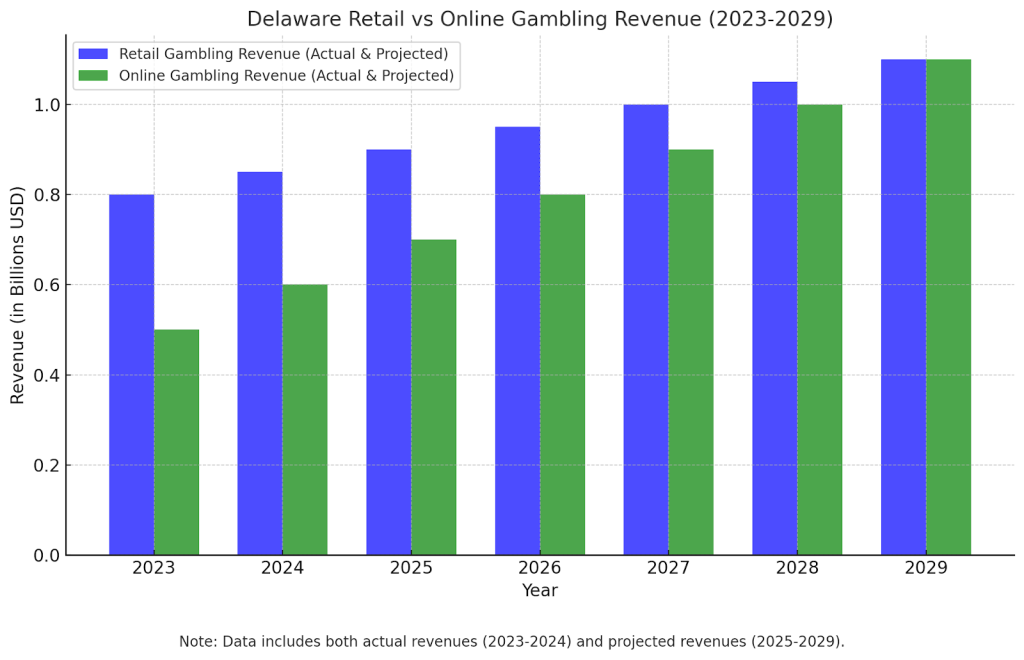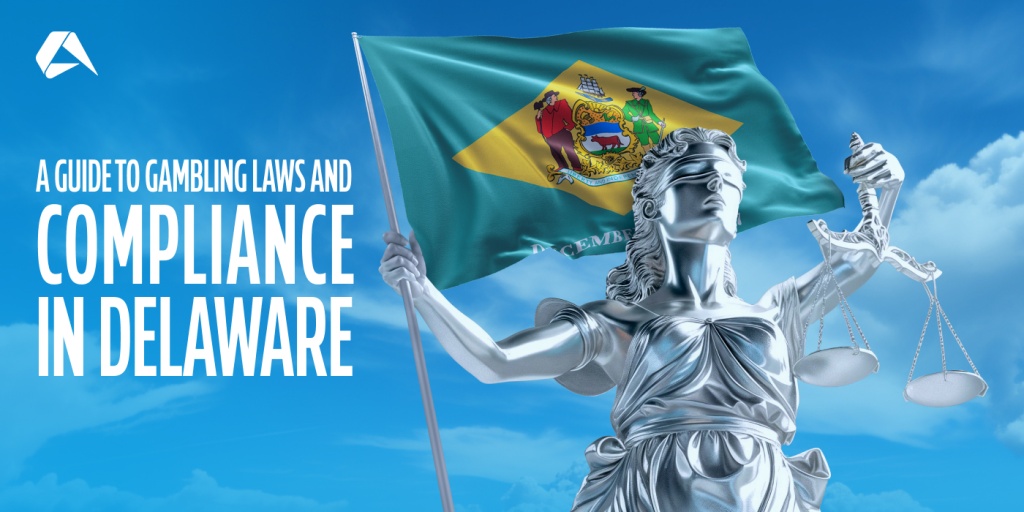Disclaimer
This information is not intended to be legal advice and is solely extracted from open sources. It should not be relied upon as a substitute for professional legal advice, and Altenar does not accept any liability for its use.
As one of the first US states to legalise online gaming, Delaware continues to offer stability, regulatory clarity, and cross-border opportunities for ambitious operators. Building on this, the state’s participation in multi-state poker liquidity agreements and proximity to larger markets like Pennsylvania and New Jersey further position the jurisdiction as an advancing market ready to reward forward-thinking operators.
However, every market has its fair share of drawbacks, and Delaware is no exception. This guide provides essential insights, sports betting information, and practical guidance for navigating regulatory challenges and maximising opportunities for gaming operators eyeing options to progress.
Historical Context of Gambling Legislation in Delaware
Delaware’s reputation as a trailblazer in gambling regulation is a far cry from its early days when the territory’s first racetracks merely hinted at the potential of organised wagering. The state's engagement with gambling dates back to the 18th century, with horse racing emerging as a popular pastime. The first racetrack within the province was established in 1760, marking the commencement of organised wagering activities. Following this, Delaware took a significant leap forward by legalising pari-mutuel betting on horse racing, positioning itself as a pioneer in regulated gambling. This move not only formalised betting practices within the state but also laid the groundwork for future gambling legislation.
The establishment of the Delaware Lottery in 1974 further expanded the region’s gambling portfolio, introducing state-run lottery games to the public. This initiative provided a new revenue stream and reflected a growing acceptance of gambling as a form of entertainment. The 1990s marked another pivotal era with the introduction of slot machines at racetracks, transforming them into "racinos". This development significantly boosted the state's gaming industry, attracting a broader audience and increasing revenues.
In 2009, Delaware continued its upward acceptance of gambling by venturing into sports betting, albeit with limitations. The state offered parlay bets on NFL games, capitalising on its unique position under the Professional and Amateur Sports Protection Act (PASPA). A landmark advancement occurred in 2012 when Delaware legalised online gambling, encompassing casino games and poker. This progressive move positioned Delaware as one of the first states to embrace internet gaming, reflecting a forward-thinking approach to the evolving gambling scene.
The repeal of PASPA in 2018 opened new avenues for sports betting. Delaware swiftly expanded its offerings to include single-game wagers across various sports, further solidifying its status as a leader in gambling innovation. Throughout these developments, public attitudes in Delaware have evolved from cautious acceptance to broad endorsement of regulated gambling. The state's legislative framework has continually adapted, balancing economic interests with social considerations, thus ensuring that gambling remains a well-regulated and integral aspect of Delaware's cultural and economic fabric.
Historic Timeline
Here’s a timeline of key milestones in Delaware’s gambling history, showing its progression from early initiatives to modern innovations:
1760: The first racetrack established for horse racing
1933: Pari-mutuel wagering on horse racing legalised
1945: First casino night fundraiser permitted
1974: Delaware Lottery introduced state-run lottery
1984: Introduction of Video Lottery Terminals (VLTs)
1992: PASPA grants Delaware sports betting exemption
1995: Slot machines added to racetracks
2009: Parlay-style sports betting legalised
2012: Online gambling legalised in Delaware
2013: Delaware Joins Online Poker Compact
2018: Full-scale sports betting launched statewide
2024: Efforts to expand sports betting through House Bill 365 fail.
The Current Situation in 2025
Delaware, known for its progressive approach to gambling, offers a range of regulated gaming opportunities in 2025. The state's three racetrack casinos, namely Delaware Park, Dover Downs, and Harrington Raceway are central to its gambling scene. These racinos combine horse racing with slot machines and table games, operating under license and contributing significantly to the local economy.
Residents can now participate in online casino games and poker through state-regulated platforms. Sports betting has also become a staple, with full-scale wagering launched in 2018 following the repeal of PASPA. Bettors can place wagers at racetrack casinos and select retail locations, and the Delaware Lottery oversees all activities.
Although Delaware remains a leader in regulated gambling, its mobile sports betting market faces restrictions. A proposed bill to allow casinos multiple sportsbook partnerships and an 18% tax rate failed in committee, and the legislative session ended without success in June 2024. Currently, BetRivers remains the state's sole online sportsbook under an exclusive contract with the Delaware Lottery.
The Legal Framework
Delaware’s gambling industry has carved a unique position in the US, building a legal framework that blends tradition with innovation across its land-based, online, and sports betting sectors. Below, we explore the regulations shaping Delaware’s gambling environment and the systems ensuring integrity across all gaming activities.
Land-Based Gambling Regulations
Land-based casino gaming and sports betting in Delaware are exclusively permitted at the state’s three racetrack casinos, Delaware Park, Dover Downs, and Harrington Raceway. These racetrack casinos, typically referred to as ‘racinos,’ are an instrumental part of the state’s land-based gambling industry, operating under tightly regulated licences from the Delaware Lottery.
These gambling venues are essentially hybrid establishments that combine horse racing tracks with casino-style gaming. They offer a mix of slot machines, poker, and classic table games such as roulette and blackjack. Licencing involves a thorough vetting process that scrutinises financial viability and operational strategies to maintain high standards.
For operators, compliance is not a one-time effort but an ongoing commitment. Detailed audits, mandatory reporting, and adherence to gaming regulations are fundamental to sustaining operations. The Division of Gaming Enforcement (DGE) plays a significant role in this process, investigating violations, monitoring activities, and safeguarding the sector's integrity.
Online Gambling Regulations
Delaware established itself as a trailblazer in online gambling when it became the first US state to implement a fully regulated framework in 2012, allowing legal-age players (21 and over) physically present within state borders to place bets. The law, enacted in 2013, covers a range of online casino games, including slots, table games, and poker, offered through partnerships between the Delaware Lottery and the state’s three racetrack casinos. This collaborative approach enables the racinos to operate online gaming services under strict oversight, ensuring compliance with state laws and providing players with reliable options.
These partnerships use geolocation technology to validate the physical presence of players in Delaware. Age verification protocols further ensure compliance with the minimum gambling age, creating a secure and legal gaming environment. While online casino gaming thrives, online sports betting remains limited under state law. Bets are only permitted at land-based casinos and, more recently, BetRivers.
Sports Betting Regulations
Delaware's sports betting regulations have evolved significantly over time. The state was among the few exempted from the PASPA of 1992, which allowed limited sports wagering activities. Following the US Supreme Court's repeal of PASPA in May 2018, Delaware swiftly expanded its offerings to include single-game wagers, launching full-scale sports betting at its three racetrack casinos.
Initially, sports betting was confined to these physical locations. However, in December 2023, Rush Street Interactive (RSI) launched its BetRivers sportsbook after securing a contract under state procurement laws, establishing it as the Delaware Lottery's exclusive mobile sports betting and online casino partner. This development marked a significant advancement in the gaming environment, providing greater accessibility and allowing bettors to place bets remotely within state lines. However, it's important to note that despite this progress, online sports betting remains limited to the BetRivers platform, with no current provisions for additional operators.
Operational Costs Considerations
Operator Licencing
Unlike other jurisdictions, the state’s racetrack casinos are not required to obtain a separate licence to offer sports betting, eliminating the need for additional licensing fees or renewals for these venues. Instead, these establishments operate sports betting under their existing gaming licences, as authorised by state law. However, operators must comply with all regulatory requirements, including adherence to financial reporting, security protocols, and responsible gambling measures.
Gross Gaming Revenue (GGR) Tax
Delaware imposes distinct tax rates on various gaming activities. For video lottery terminals (VLTs), the state collects and distributes revenue as follows: approximately 43% to racetracks as commissions 39% to the State General Fund, 10% for horse racing purses, and 8% to vendor fees.
Table games in Delaware are taxed at 15.5% on licensees, with an additional 4.5% allocated as a purse supplement for horse racing, as outlined in Section 4815(d), Title 29, Del. C. Sports betting revenues are distributed as follows: 50% to the State General Fund, 40% to operating racetracks, and 10% to racing purses.
In comparison, Delaware's rates are among the higher iGaming taxes in the United States, though operators should assess these rates in the context of Delaware's market conditions and regulatory environment.
NOTE:
This information is provided for general informational purposes only and should not be considered legal or financial advice. Tax rates and regulatory requirements are subject to change. For the most up-to-date details on gambling taxation in Delaware, refer to official regulatory sources.
Regulatory Bodies Governing Gambling in Delaware
Specialised authorities govern Delaware's gambling industry. Between them, they oversee the industry's integrity, the implementation of player protections, and adherence to state and federal regulations.
The Delaware Lottery
As the primary gambling regulator in Delaware, the Delaware Lottery oversees all legal gaming activities within the state. This includes state-run lotteries, racetrack casinos (racinos), video lottery terminals, online gaming, and sports betting. Established under Title 29 of the Delaware Code, it has the mandate to issue licences, monitor compliance, and ensure the trustworthiness of operations by conducting regular audits. The Delaware Lottery collaborates with other state agencies, such as the Delaware Division of Gaming Enforcement, to enforce compliance and address any legal issues related to gambling activities. It also partners with private operators to provide online gaming services.
Division of Gaming Enforcement (DGE)
Operating under the Department of Safety and Homeland Security, the Division of Gambling Enforcement holds exclusive jurisdiction over gaming-related criminal offences within licensed video lottery facilities and the Delaware Lottery's operations. Its responsibilities encompass conducting thorough background investigations of licence applicants and ensuring that only qualified individuals and entities participate in the gaming sector. The DGE also collaborates with the Delaware Lottery to develop and enforce regulations to uphold public trust in gaming activities. In addition, the division liaises with other law enforcement agencies to share intelligence and coordinate efforts.
Delaware Racing Commission (DTRC)
The Racing Commission governs horse racing activities in Delaware, including licensing racetracks and enforcing rules for pari-mutuel wagering. The Commission oversees thoroughbred and Arabian horse racing within the state, with the primary objectives of ensuring the health and welfare of horses, safeguarding jockey safety, and eliminating illegal practices. It works closely with racetrack casinos to regulate live racing and ensure compliance with industry standards. The DTRC is also responsible for licensing participants, enforcing racing rules, and auditing wagering activities to secure fair distribution of revenues to the state and bettors. Operating under the Delaware Department of Agriculture, the Commission collaborates with other regulatory bodies to maintain the honesty of horse racing in Delaware.
Financial Crimes Enforcement Network (FinCEN)
The Financial Crimes Enforcement Network is a federal agency operating under the US Department of the Treasury. As in other gambling states in the US, it plays a significant role in overseeing anti-money laundering (AML) compliance within Delaware's gambling sector. FinCEN mandates that casinos and gaming establishments implement comprehensive AML programs, including customer due diligence and reporting suspicious activities. These requirements are outlined in its code of regulations (eCFR). By enforcing these protocols, the Financial Crimes Enforcement Network aims to prevent illicit financial activities within the gaming industry. The agency collaborates with state regulators, such as the Delaware Division of Gaming Enforcement, to ensure that gaming operators adhere to both federal and state AML obligations.
Outlook and Future Trends
Delaware offers iGaming operators an interesting gateway to a well-regulated, growth-oriented gambling market by setting the standard for a controlled yet innovative gaming environment since first legalising online gambling in 2012. The state's iGaming sector saw wagers nearing $170.7 million in September 2024, generating $5.8 million in net gaming revenue. This is yet another steady sign of its industry’s huge potential in the state, particularly in a population known for its enthusiasm for gaming.

The state’s three racetrack casinos anchor this market. They not only attract players to land-based activities but also power Delaware’s online platforms, creating a cohesive integration of offline and digital gambling. "Delaware’s unique model shows how traditional gambling venues can drive digital innovation, setting the stage for future growth in the US. market," says Jason Lloyd, iGaming Regulatory Consultant, highlighting the state’s forward-thinking approach.
Delaware’s tax framework may appear significant for operators, but its transparent and centralised regulatory structure does much to offset the challenge. The Delaware Lottery and Division of Gaming Enforcement ensure a straightforward compliance process, giving operators a clear roadmap.
Despite recent setbacks with the failure of House Bill 365, Delaware has demonstrated a commitment to enhancing its gambling market. In addition to the launch of the Rush Street Interactive BetRivers sportsbook, becoming the exclusive mobile sports betting and online casino partner of the Delaware Lottery, recent moves in online poker look promising. The state has participated in the Multi-State Internet Gaming Agreement (MSIGA), which allows for shared online poker liquidity with states like Nevada and New Jersey. These developments indicate Delaware's intent to expand its gaming offerings and present possible avenues for operators looking to enter a growing market.
Pros and Cons of the Delaware Gambling Market
Market Advantages:
-
Regulatory Clarity: A streamlined regulatory framework reduces compliance complexity for new entrants.
-
Comparatively Low Competition: With a limited number of licensed operators, there’s less competitive pressure compared to larger markets.
-
Strategic Location: Proximity to larger markets like Pennsylvania and New Jersey provides spillover opportunities for interstate operations.
-
Player Engagement: Enthusiastic player base with consistent online and offline gambling participation.
Market Disadvantages:
-
Small Population: Limited market size compared to larger states reduces the player pool.
-
Restricted Mobile Sports Betting Market: Recent attempts to expand mobile sports betting have failed, preventing new operators from entering the space.
-
No Independent Licensing for Sportsbooks: Independent sportsbooks cannot directly apply for a license.
Gambling Licence Availability
Online casino games may only be offered by the state’s three racetrack casinos using a platform controlled by the Delaware Lottery. Under state procurement laws, Rush Street Interactive (RSI) launched the BetRivers sportsbook and online casino platform in December 2023 as the exclusive provider for the Delaware Lottery. As a result, there is no separate licensing process for iGaming operators seeking to enter the market independently.
Seize New Market Opportunities with Altenar’s Proven iGaming Platform
From state-regulated casino gaming to sportsbook solutions, Altenar equips operators with the technology needed to compete and stay ahead of regulatory shifts in U.S. markets.
Enter New markets confidently and schedule a demonstration of Altenar’s compliant iGaming software today.
Disclaimer
This information is not intended to be legal advice and is solely extracted from open sources. It should not be relied upon as a substitute for professional legal advice, and Altenar does not accept any liability for its use.













